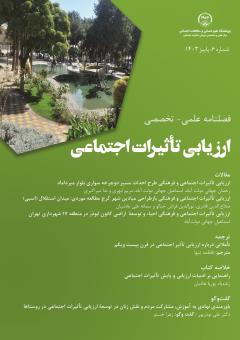ارزیابی تأثیرات اجتماعی و فرهنگی احیا و توسعۀ اراضی کانون ابوذر در منطقه 17 تهران
محورهای موضوعی : ارزیابی تأثیرات اجتماعی، فرهنگی، اقتصادی، محیط زیستی و... سیاستها، برنامهها، طرحها و پروژهها
1 - دانشیار جامعهشناسی، دانشگاه محقق اردبیلی، اردبیل، ایران
کلید واژه: اراضی کانون ابوذر, مجموعه فرهنگی ورزشی و ارزیابی تأثیرات اجتماعی, منطقۀ 17 تهران,
چکیده مقاله :
مطالعه حاضر با هدف ارزیابی تأثیرات احیا و توسعۀ اراضی کانون ابوذر در منطقه 17 تهران به مرحله اجرا درآمده است. مدل نظری پژوهش بر مفهوم عدالت فضایی و توسعه پایدار استوار بوده، برای ارزیابی تأثیرات اقدام از روشهای مختلف کمی و کیفی، اعم از انجام پیمایش در حوزۀ مداخله پروژه، مصاحبه با گروههای مختلف ذینفع و نیز مشاهدات میدانی استفاده شده است. ارزیابی تأثیرات در قالب سه سناریوی تداوم وضع موجود، تغییر وضع موجود و تعدیل وضع موجود صورت گرفته و تأثیرات هر سناریو در چهار حوزۀ ترافیکی، اجتماعی، محیطی و نهادی بررسی شده است. طبق نتایج، محدودۀ مورد بررسی در وضعیت فعلی با مسائل ترافیکی، اجتماعی و نهادی دست به گریبان است که در صورت تحقق سناریوی اول در هر چهار حوزه یادشده، تأثیرات منفی غلبه خواهد کرد. تحقق سناریوی دوم در کنار تأثیرات مثبت قابل توجه، به دلیل اتکا به رویکرد تقابلی با سازمانهای ذینفع، اجرای پروژه را با تأثیرات منفی و هزینههای متعددی مواجه خواهد ساخت. اما در صورت تغییر رویکرد یادشده و اتخاذ موضع تعاملی و مبتنی بر مدیریت مشارکتی در اجرای پروژه (سناریوی سوم)، بخش قابل توجهی از تأثیرات منفی یادشده منتفی بوده، بخش زیادی از تأثیرات مثبت سناریوی قبلی نیز به قوت خود باقی خواهد بود. بر همین اساس گروه اتاف، سناریوی سوم را به عنوان سناریوی برگزیده پیشنهاد نموده و در راستای تحقق این سناریو، کاربست پیشنهادی را در قالب سه مقولۀ نظام بسامد اجرا، نظام کارآمد ارتباطی و نظام هوشمند پایش ارائه نموده است.
The present study has been implemented with the aim of evaluating the effects of the revitalization of the Abzar center in the 17th district of Tehran. My theoretical model is based on spatial justice and sustainable development, and various quantitative and qualitative methods have been used to evaluate the consequences of the action. The consequences have been evaluated in the form of three scenarios of continuation, change, and adjustment of the status quo, and each scenario have been examined in four areas: traffic, social, environmental, and institutional. According to the results, in the current situation, the area under investigation is struggling with much traffic, social and institutional issues, and if the first scenario is realized, we will witness the complete dominance of the negative effects in all four mentioned areas. The realization of the second scenario, along with significant positive effects, due to the reliance on a confrontational approach with the beneficiary organizations, will increase the negative consequences and costs. In case of changing the mentioned approach and adopting an interactive position and based on participatory management, a significant part of the mentioned negative consequences will be excluded and a large part of the positive consequences of the previous scenario will remain in force. Based on this, the ATAF team has proposed the third scenario as the best scenario and in order to realize this scenario, it has presented the proposed application in the form of three categories of execution frequency system, efficient communication system and intelligent monitoring system.
